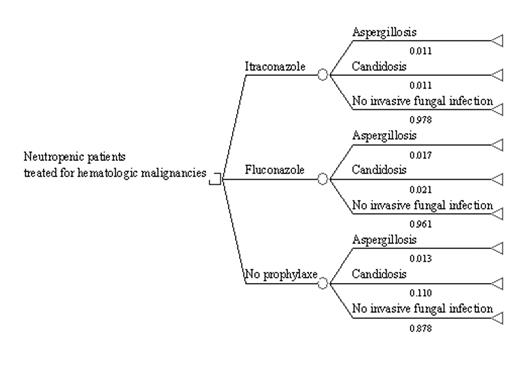Abstract
Background: Invasive fungal infections present a leading cause of mortality and morbidity in neutropenic patients treated for hematologic malignancies. As the diagnosis and management of invasive fungal infections is difficult, effective antifungal prophylaxis is desirable. Itraconazole is a broad spectrum antifungal agent with activity against Candida species as well as Aspergillus species, whereas fluconazole primarily targets Candida. There is no published data comparing cost-effectiveness of both antifungal agents.
Objective: To asses the cost-effectiveness of itraconazole compared with (i) prophylactic fluconazole and with (ii) no prophylaxis in the prevention of invasive fungal infections in Germany, the Netherlands and the UK.
Methods: A probabilistic decision model was designed to evaluate the incremental cost-effectiveness of itraconazole versus fluconazole and versus no prophylaxis (see Figure). Baseline risks for invasive fungal infections and risk reductions for itraconazole (>200mg/day) and fluconazole (400mg/day PO or 200mg/day IV) were taken from studies recently published in two meta-analyses. Costs were evaluated from the health care perspective. Drug acquisition costs for the two prophylactic regimens were calculated using 2003 prices. We estimated the increase in the length of stay as a result of an invasive infection using local or national databases and costed this using reference prices.
Results: The meta-analysis revealed that itraconazole is effective in averting invasive fungal disease, in particular aspergillosis. The mean increase in the length of stay for invasive fungal infections was estimated at 9.3 days (rather similar for all 3 countries). As an illustration for our findings: in the Netherlands, itraconazole prophylaxis was expected to be cost-saving compared to fluconazole and provided limited extra costs compared to no prophylaxis at all. Cost-effectiveness was €470 per invasive infection averted for the itraconazole compared to no prophylaxis (95%-CI ranging from cost-saving to €5926 per infection averted). Other country-specific results will be presented at the conference.
Discussion & Conclusions: Our study shows that itraconazole prophylaxis is effective and is clinically likely to result in cost-savings or provide an acceptable cost-effectiveness. Itraconazole should be the first choice in the prophylaxis of invasive fungal infections in neutropenic patients with hematologic malignancies, from the clinical and economic point of view.
Author notes
Corresponding author


This feature is available to Subscribers Only
Sign In or Create an Account Close Modal